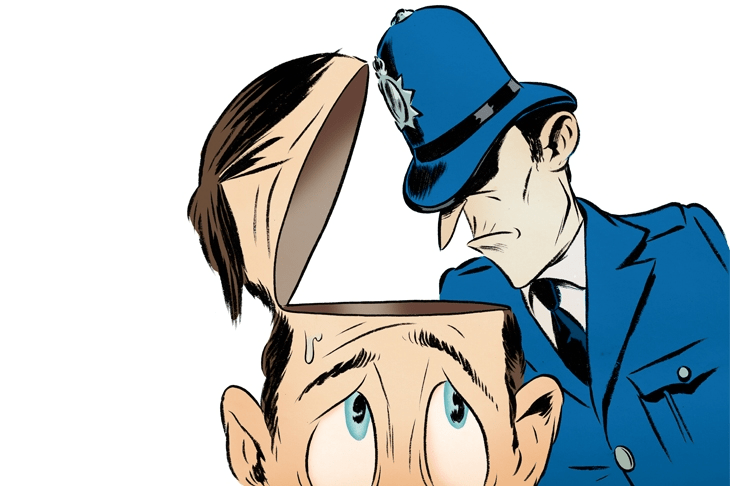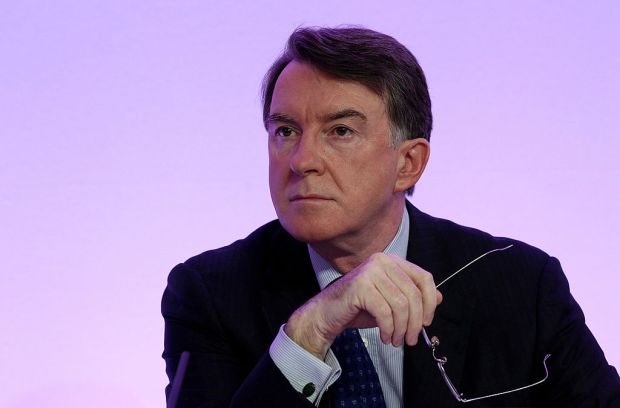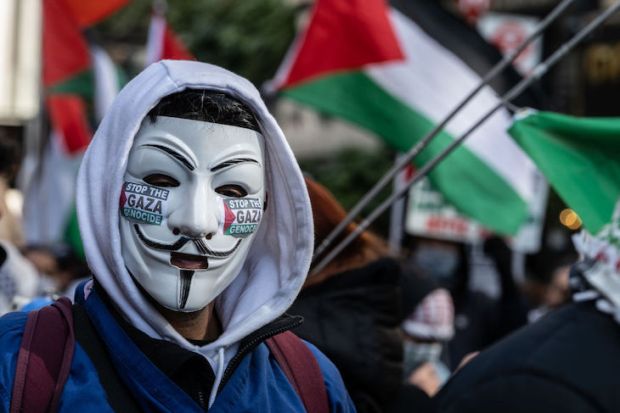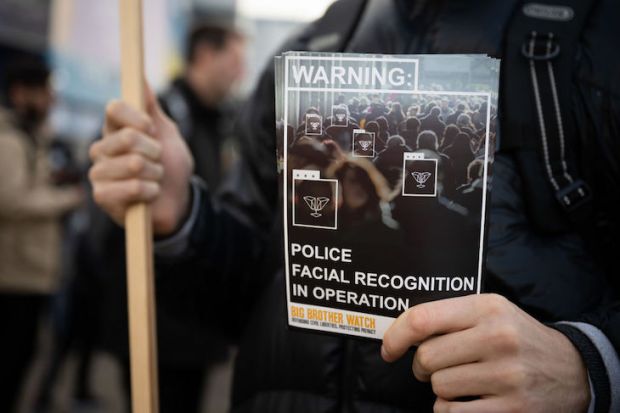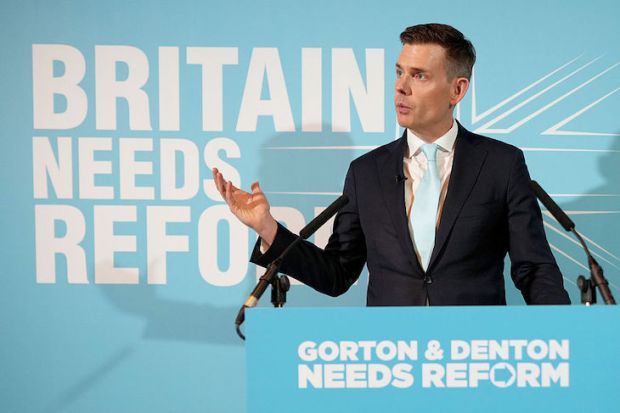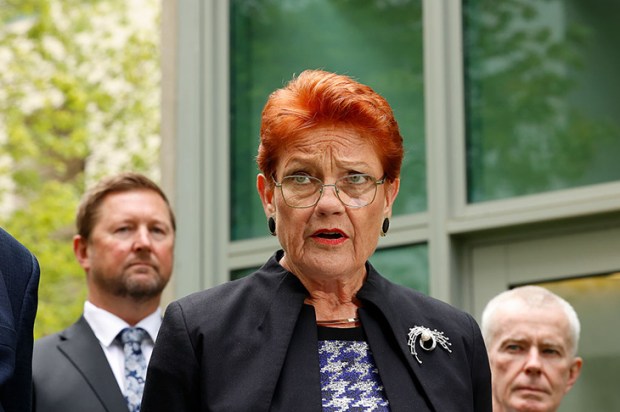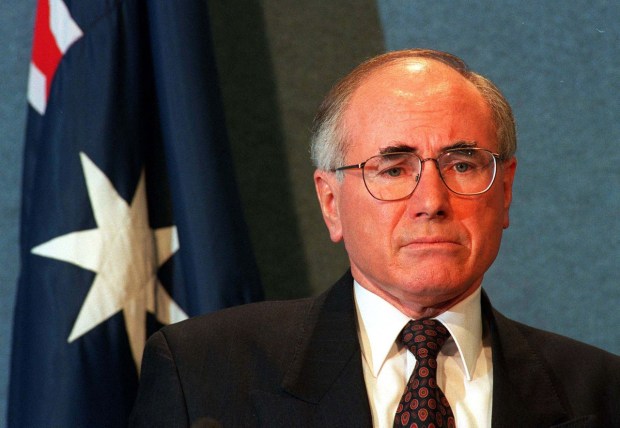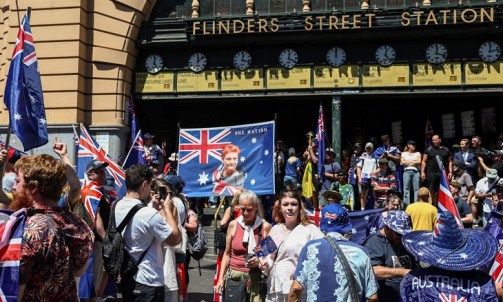I’m old enough to remember when ‘it’s a free country’ was a phrase people used in conversation. It feels like it was the kind of thing they said regularly, either when someone asked permission to do something or when commenting on some particular eccentricity. Can I sit there? It’s a free country. You want to walk around dressed up as a pirate? Well, it’s a free country.
Perhaps it reflected a self-conscious British sense of themselves as freedom-loving people – which isn’t really true, or at least hasn’t been since 1914 – or maybe it was a Cold War thing. But I don’t think I’ve heard the phrase in at least 20 years, and perhaps that’s because it’s just not true anymore. If that sounds like the sort of hysteria you’d expect from a conservative commentator who’s been on the sherry, just consider a few recent cases.
Take, for example, the story of a singer called Louise Distras who was arrested by police and questioned about comments she made on GB News about ‘trans-right extremists’. According to the Mail story, officers appeared at her door and proceeded to take her fingerprints and DNA. She said she had not committed any crimes and was later told no action would be taken against her.
Or the six former police officers convicted of sending offensive Boomer memes in a private WhatsApp group called ‘Old Boys Beer Meet’, private messages deemed to be too outrageous for the fragile public to see for themselves.
They were lucky to escape jail. Last year another British citizen was sentenced to 20 weeks in prison for sending offensive jokes in a WhatsApp chat with friends.
Or consider the case of police in Edinburgh turning up at the home of a parent who had complained to the school about a teacher ‘being allowed to impose her gender ideology on a classroom of little kids’.
Or the teenager prosecuted for posting the lyrics of a rap song on her Instagram, because the music in question included the N-word. The 18-year-old girl, who has Asperger’s, was given an eight-week curfew and had to wear a tag, though the conviction was later overturned.
Or how about the Conservative MP found guilty of a racially aggravated public order offence and fined £600 because he told an activist to ‘Go back to Bahrain.’
Or the case of Newcastle United banning a fan for more than two seasons for tweeting that trans ideology was harmful. Perhaps that is the club’s business – after all, the Saudi Arabian-owned Premier League outfit are allowed to take a sincere stance on progressive politics – except that she was also interviewed by police.
Or the woman who was interrogated by police after photographing a sticker on a trans pride poster, after which the police logged a non-crime hate.
Or the Conservative councillor arrested for an alleged hate crime after re-tweeting a video criticising how the police treated a Christian street preacher.
Then there was the case of the teenager arrested over saying a policewoman looked like her ‘lesbian nana’.
Then there is the question of ‘silent prayer’, with police investigating Christians praying near abortion buffer zones, including a Catholic priest. This issue is admittedly less clear-cut than people being arrested for online comments, since there is the argument that it causes potential harm to women in a vulnerable state; nevertheless, it essentially means the authorities reading people’s thoughts.
Some of the individuals caught up by these illiberal laws are very unsympathetic or idiotic. There was a Northern Ireland man jailed for three months for posting a ‘grossly offensive’ animated image of a murder victim which he somehow hoped would ‘lighten the mood.’ Or the man convicted after posting a grotesque mock-up video of the Grenfell Tower; a horrible and bizarre thing to do, but worth a conviction? So no, Britain is not a free country, and it’s worth pondering why this isn’t of greater concern.
To show how disproportionate these punishments are, the six retired police officers received similar sentences to a teacher caught with 11,500 indecent images; last year’s four-month jail sentence for a man mocking George Floyd in a private WhatsApp chat came just a fortnight after two individuals were spared jail for putting a complete stranger in a coma. As I have attempted to show with my British crime thread, violent offenders routinely receive very short sentences, or escape jail altogether.
In fact, if you walk around the centre of almost any British city you will see petty crime unpunished in a way that contrasts with the strict laws around speech. Around the corner from the Home Office in Westminster you may even see people taking hard drugs openly in daylight. This is anarcho-tyranny in action.
Much of this is down to section 127 of Communications Act (2003), which creates very harsh restrictions on freedom of speech. The liberal Economist recently lamented of this law that: ‘For a government that portrays itself as the protector of free speech, this is a sorry affair. Conservative ministers may despair at “cancel culture” or the excesses of censorious students. Yet when it comes to something much more fundamental—restricting the ability of the state to jail someone for speaking out of turn—the government is happy to maintain a deeply illiberal status quo.’
It is also an illiberal status quo that tends to punish only certain opinions. Aside from the Glasgow man convicted of tweeting about Captain Tom, the vast majority of these cases seem to involve people who have offended progressive norms, or who are seen as being enemies of the progressive alliance. While middle-aged women who question the prevailing beliefs over gender are visited by police, and football fans are arrested for the smallest offence, extremist imams who preach jihad seem to get a relatively easy ride.
The law doesn’t seem to treat all groups the same. After the six former Metropolitan Police officers were convicted of sending messages on their WhatsApp group, Laurie Wastell noted in The Critic that:
The same judge also heard the case of “Sarah Jane Baker,” a transwoman (i.e., a biological male) who had been out on licence while serving a life sentence for attempted murder, kidnapping, and torture. In July, Baker told an audience of trans activists in London, “If you see a TERF, punch them in the fucking face.” Quite unlike [the former police officer’s] boomer meme about parrots, this was said in a public place, by a violent felon, to an extremist movement that has repeatedly visited violence on said “TERFs” — that is, against gender-critical feminists, typically women. Ikram nevertheless ruled that this was not criminal speech, and even appeared to endorse the Trans+ Pride march that day, saying, “you wanted publicity for your cause”.
All this would be bad enough if Ikram was an exception, but he and his ideas are in truth embedded in the British judicial establishment. At the 2022 New Year Honours he was appointed Commander of the Order of the British Empire (CBE) by Boris Johnson for “services to judicial diversity”. And Ikram is among contributors to the Equal Treatment Bench Book, UK judiciary diversity guidance which employs many central tenets of identity politics, like “systemic” or “structural” racism, “unconscious bias,” and “micro-aggressions.” This ideology, which holds that individuals should be favoured or disfavoured according to their immutable characteristics, runs flatly counter to the bedrock legal principle of equal treatment before the law.
Indeed. In his review of Rod Dreher’s Live Not By Lies, Niall Gooch described ‘soft totalitarianism’ as a state where ‘interpersonal freedoms — those related to sexual expression and sexual self-definition, to the actualisation of a self created by an individual for themselves — are sacrosanct, whereas old-fashioned concrete liberties of speech and thought and assembly and debate, are up for grabs. This is Philip Rieff’s “triumph of the therapeutic”, where the state will protect us from disapproval, challenge and criticism — even if that requires the destruction of proper freedoms.’
Old-fashioned concrete liberties are far more important than sacrosanct matters of sexual or cultural identity, yet these sorts of liberties are rarely considered in wider debates about the health of liberal democracy. Hardly a week goes by when the government isn’t compared to Nazi Germany, but there is relatively little concern over the things that really do constitute freedom.
Richard Hanania once wrote about how the measures of freedom calculated by NGOs like Freedom House were skewed and worthless, because they were more concerned with those interpersonal freedoms than with actual concrete liberties. What matters to most people is simply whose side you’re on, and it goes without saying that a right-wing European regime in which police turned up at people’s doors for expressing unfashionable opinions would be roundly condemned – and rightly so.
What makes our anarcho-tyranny all the more illiberal is that no one can be entirely sure what exactly are the unfashionable opinions deemed worthy of the state’s interference. In recent years moral norms have changed so quickly that people can find themselves in trouble for saying things that were totally mainstream ten years ago. In many cases they might not even be aware about the unspoken edict that such an opinion is now verboten, and I suspect it is not a coincidence that so many of the individuals caught out by this new tyranny have some form of autism.
Yet we all lose out when our freedoms are eroded. Freedom of speech and freedom of association are by far the most essential bedrocks of liberty, and both have declined in recent decades for reasons related to issues of identity. Indeed, one might even say that those cornerstone freedoms are incompatible with the worldview which has now become all-powerful, and which sends the police around to the homes of citizens when they express a deviant opinion. It’s not a free country, after all.
This article first appeared in Ed West’s Wrong Side of History Substack.

